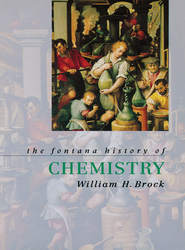скачать книгу бесплатно
The Fontana History of Chemistry
William J. Brock
The Fontana History of Chemistry, which draws extensively on both the author’s own original research and that of other scholars world wide, is conceived as a work of synthesis. Nothing like it has been attempted in decades.Beginning with the first tentative chemical explorations where primitive technology and techniques were deployed, Dr Brock proceeds via the alchemists’ futile, but frequently profitable, efforts to turn lead into gold to recount the emergence of the modern discipline of chemistry as fashioned by Boyle, Lavoisier and Dalton. He provides a particularly generous critical account of chemical developments during the last 150 years, emphasizing the roles of purity, analysis and synthesis, the exploration of reaction mechanisms, and the industrialization of chemical change, while also weighing up just how chemistry has been taught and disseminated.While brilliantly successful in explaining and exploiting chemical change, modern chemistry - in academy and factory alike - with its recondite language and symbolism and its associations with pollution and danger, prompts more fear than excitement in the uninitiated bystander. This book seeks to enlighten that bystander: to assess links between theory and practice, to reveal recurrent cycles and themes, and to encourage a heightened awareness of the human dimensions of the chemical sciences which might in turn promote a better public understanding of chemistry and the modern chemical and phamaceutical industries..
FONTANA HISTORY OF CHEMISTRY
(Editor: Roy Porter)
THE FONTANA HISTORY OF
CHEMISTRY
William H. Brock
CONTENTS
COVER (#u2ee28a15-a2e9-544a-b2f4-9fe2c7fa83a2)
TITLE PAGE (#u78a429ea-61db-524d-a43f-c4338d91974b)
PREFACE TO THE FONTANA HISTORY OF SCIENCE (#ue558ed06-58f5-55d2-a1c8-ff8b0888b95d)
BIBLIOGRAPHICAL NOTE (#u6490be1d-ff88-5532-87a5-b0b3948cf078)
INTRODUCTION (#u2ee4ed53-fa4d-5776-86ed-e71bc0b73af0)
1 On the Nature of the Universe and the Hermetic Museum (#ucc5ee2d2-46be-5f63-bc98-143c6abfe40e)
Chinese Alchemy (#ulink_27242782-e985-5736-8c34-690c2947fb6b)
Greek Alchemy (#ulink_50ad4893-ebd6-5625-9188-92b86c64539d)
Arabic and Medieval Alchemy (#ulink_dba7c888-77b8-5357-8db7-2997143db1b4)
Newton’s Alchemy (#ulink_ba39cd52-2b8b-5980-b593-68a221b586b1)
The Demise of Alchemy and its Literary Tradition (#ulink_890bb1d3-fa42-51ed-a05d-49a506a1ea37)
2 The Sceptical Chymist (#u00823171-fde7-5a6c-bc26-c449eba06629)
Paracelsianism (#ulink_f1c5a2fa-85f5-5ca5-b998-d8c848f6633c)
Helmontianism (#ulink_6d480e93-4763-5d1c-89d6-a4a97db8fc06)
The Acid-Alkali Theory (#ulink_4c893158-a317-5ec3-a9a4-3ee7998696d2)
A Sceptical Chemist (#ulink_c536a75c-9c37-5eef-9a5a-969caa0c7ee2)
Boyle’s Physical Theory of Matter (#ulink_11917ce3-8b12-520a-8b4a-3c71172b4b4e)
The Vacuum Boylianum and its Aftermath (#ulink_3745a7b9-b1f2-59a2-8bee-7894885445dc)
Newton’s Chemistry (#ulink_a281777e-8797-57c1-a787-dbd910ace448)
The Phlogistonists (#ulink_2830e84d-e936-5e82-bd93-ddf28e2d797e)
Conclusion (#ulink_dba6cb47-5470-5f13-9931-a9329c2f25a8)
3 Elements of Chemistry (#ufe9ee5a1-cbdc-54ad-9eb4-3eebc6b16405)
A Scientific Civil Servant (#ulink_b50ef863-f837-5647-89d5-702081c84190)
The Chemistry of Air (#ulink_9cab90ce-3365-5b96-b174-c44fd953e11f)
The Chemical Revolution (#ulink_f9e408eb-c397-5922-b2d6-ec9502fff60f)
The Aftermath (#ulink_1c7fde40-7136-5ecf-84cc-e5c16cc69a12)
Conclusion (#ulink_52ad8279-7dd3-5b49-ab17-640143a31fec)
4 A New System of Chemical Philosophy (#u201bd700-69b8-5381-83a3-85c1fae70287)
Dalton’s ‘New System’ (#ulink_65eb24c3-9581-55bb-9d2a-683b14b4166c)
Dalton’s Life (#ulink_7d9ed39a-d8ee-5d47-a782-ec240d610337)
The Atomic Theory (#ulink_db2537ad-856e-56f6-a0c6-320766c7a079)
The Origins of Dalton’s Theory (#ulink_219597aa-31b1-5994-9719-e9bb085cdc3a)
Electrifying Dalton’s Theory (#ulink_81a2eb9e-8eae-5e90-b78a-25c35f694395)
Chemical Reactivity (#litres_trial_promo)
Prout’s Hypothesis (#litres_trial_promo)
Volumetric Relations (#litres_trial_promo)
Scepticism Towards Atomism (#litres_trial_promo)
Conclusion (#litres_trial_promo)
5 Instructions for the Analysis of Organic Bodies (#litres_trial_promo)
Purity (#litres_trial_promo)
The Basis of Chemistry (#litres_trial_promo)
The Supply of Apparatus and Chemicals (#litres_trial_promo)
Liebig, Organic Analysis and the Research School (#litres_trial_promo)
Conclusion (#litres_trial_promo)
6 Chemical Method (#litres_trial_promo)
Classifying by Radicals (#litres_trial_promo)
Classification by Types (#litres_trial_promo)
7 On the Constitution and Metamorphoses of Chemical Compounds (#litres_trial_promo)
The Establishment of Quantivalence (#litres_trial_promo)
Kekulé and the Theory of Chemical Structure (#litres_trial_promo)
The Triumph of Structural Theory (#litres_trial_promo)
8 Chemistry Applied to Arts and Manufactures (#litres_trial_promo)
The Alkali Industry (#litres_trial_promo)
Dyestuffs and Colouring (#litres_trial_promo)
9 Principles of Chemistry (#litres_trial_promo)
Sorting the Elements (#litres_trial_promo)
The Rare Earths (#litres_trial_promo)
The Inert Gases (#litres_trial_promo)
Manufacturing Elements (#litres_trial_promo)
Mendeleev’s Principles (#litres_trial_promo)
Conclusion (#litres_trial_promo)
10 On the Dissociation of Substances Dissolved in Water (#litres_trial_promo)
Proto-Physical Chemistry (#litres_trial_promo)
Raoult and van’t Hoff (#litres_trial_promo)
Electrochemistry from Faraday to Arrhenius (#litres_trial_promo)
The Ionic Theory (#litres_trial_promo)
The Reception of the Ionic Theory (#litres_trial_promo)
11 How to Teach Chemistry (#litres_trial_promo)
Frankland’s State-sponsored Chemistry (#litres_trial_promo)
Armstrong’s Heuristic Method (#litres_trial_promo)
Twentieth-century Developments in Teaching (#litres_trial_promo)
The Laboratory (#litres_trial_promo)
12 The Chemical News (#litres_trial_promo)
Forming Chemical Societies (#litres_trial_promo)
The Chemical Periodical (#litres_trial_promo)
William Crookes, Chemical Editor (#litres_trial_promo)
13 The Nature of the Chemical Bond (#litres_trial_promo)
The Lewis Atom (#litres_trial_promo)
Spreading the Electronic Theory (#litres_trial_promo)
The Pauling Bond (#litres_trial_promo)
14 Structure and Mechanism in Organic Chemistry (#litres_trial_promo)
The Lapworth-Thiele-Robinson Tradition (#litres_trial_promo)
The Michael-Flürscheim- Vorlãnder Tradition (#litres_trial_promo)
The Electronic Theory of Organic Reactions (#litres_trial_promo)
Organizing the Structure of Organic Chemistry (#litres_trial_promo)
The Kinetics of Mechanisms (#litres_trial_promo)
The Spread of Physical Organic Chemistry (#litres_trial_promo)
Aromaticity (#litres_trial_promo)
The Non-classical Ion Debate (#litres_trial_promo)
Conclusion (#litres_trial_promo)
15 The Renaissance of Inorganic Chemistry (#litres_trial_promo)
Werner’s New Ideas (#litres_trial_promo)
